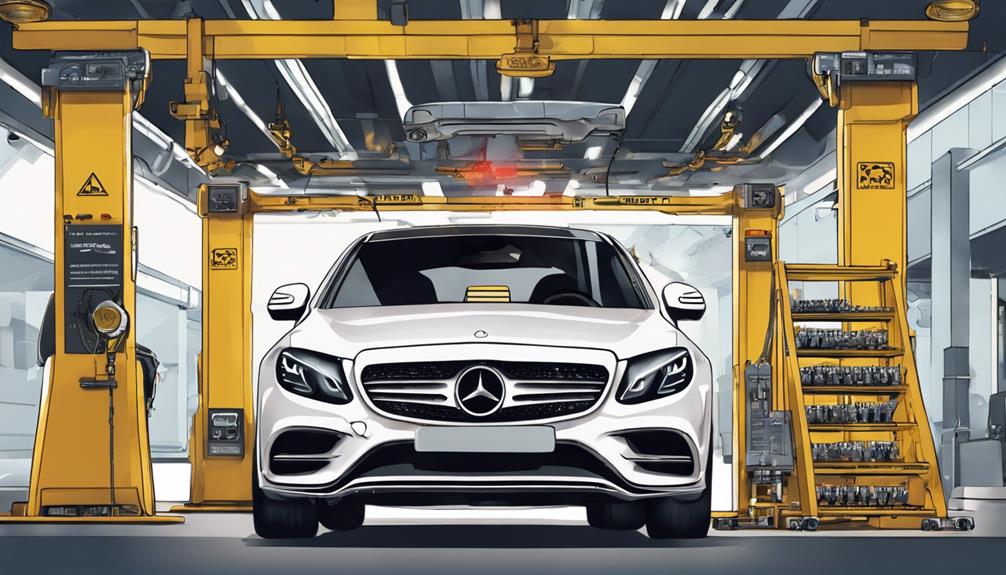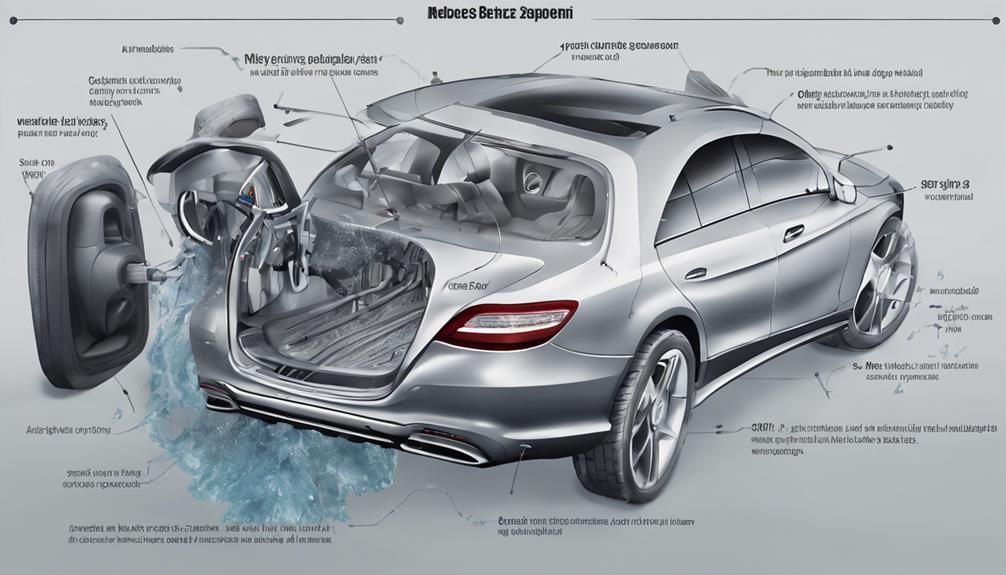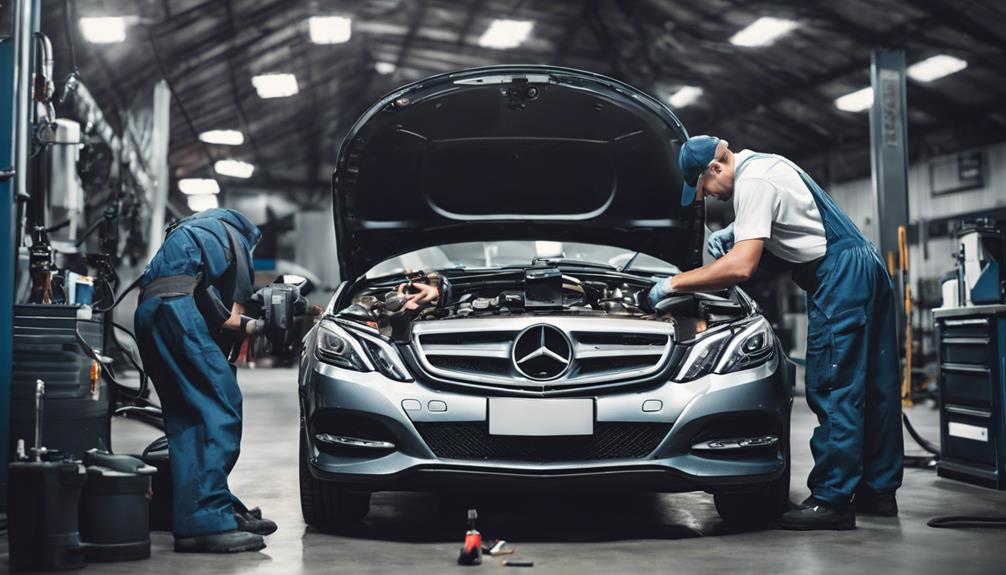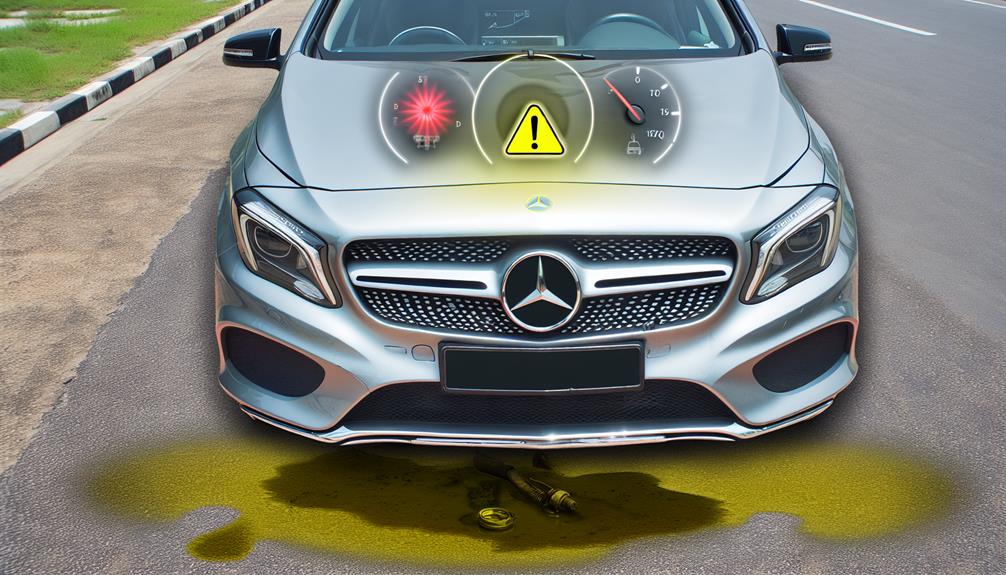Considering the Mercedes Airmatic's reliability, keep in mind the air compressor failures, compromised system integrity from leaking struts, and aging rubber components issues. Signs of troubles include your vehicle sitting too low, leaning, or sagging strangely. Various factors influence Airmatic's reliability like rubber component lifespan and upgrading to newer systems. Maintenance is key; neglect leads to major issues, so stay on top of it. To guarantee Airmatic longevity, regular checks, monitoring for odd compressor noises, and prompt leak fixes are vital. Keep these points in mind for a well-rounded view on Airmatic's dependability.
Key Takeaways
- Finite lifespan of rubber components affects AIRMATIC reliability.
- Newer Mercedes models exhibit improved AIRMATIC dependability.
- Regular maintenance enhances AIRMATIC system's reliability.
- Upgrading to newer AIRMATIC systems reduces common issues.
- Monitoring for leaks and unusual noises preserves AIRMATIC longevity.
Common Issues With Mercedes Airmatic

If you've ever owned a Mercedes with AIRMATIC suspension, you may have encountered the frustrating reality of common issues plaguing this system. One prevalent problem lies with the AIRMATIC air compressor. It's no surprise that failure in this component can lead to system malfunctions, disrupting the smooth operation of the air springs that are fundamental to the AIRMATIC suspension system. Moisture seeping into the AIRMATIC air compressor poses another challenge, causing damage that can greatly impact the overall performance of the suspension.
The integrity of the AIRMATIC system is further compromised by leaking AIRMATIC struts, often a consequence of aging rubber components. When these essential parts fail, the system struggles to maintain the proper ride height, resulting in a less-than-ideal driving experience characterized by a bumpy ride. These common issues demand attention and timely intervention to make sure the AIRMATIC suspension functions reliably.
Signs of Airmatic System Failure
In detecting potential issues with your Mercedes Airmatic system, observing key signs of failure can provide valuable insights into the health of your vehicle's suspension.
One clear indicator of Airmatic system trouble is when your vehicle sits too low, often due to the compressor failing to inflate the bellows properly.
Additionally, if you notice your Mercedes leaning or sagging on one side, it could be a sign of air strut failure within the Airmatic system.
Leaking air lines in the Airmatic system can lead to deflated bellows, affecting both the stability and ride quality of your car.
Besides, a malfunctioning valve block can cause air leaks, resulting in a lower ride height and potentially impacting your Mercedes AIRMATIC Suspension's performance.
Keep an eye out for these signs to address any potential Airmatic system issues promptly and keep your Mercedes running smoothly.
Factors Affecting Airmatic Reliability

With advancements in technology and design, newer Mercedes AIRMATIC systems generally exhibit improved reliability compared to their predecessors. When considering factors affecting AIRMATIC reliability, it's important to understand the impact of various components on the system's overall performance. Here's what you should know:
- The finite lifespan of rubber components in the AIRMATIC system can impact its reliability over time.
- Common air suspension problems, like the need for replacement parts such as rubber components, can have a notable effect on the overall reliability of the AIRMATIC system.
- User experiences suggest that newer Mercedes models equipped with AIRMATIC suspension tend to demonstrate better reliability when compared to older models.
- Upgrading from older AIRMATIC systems to newer models has been reported to result in fewer reliability issues, showcasing the importance of staying up-to-date with the latest advancements in Mercedes technology.
Understanding these factors can help Mercedes owners make informed decisions to guarantee the reliability and longevity of their AIRMATIC systems.
Importance of Airmatic Maintenance
Proper maintenance of your Mercedes Airmatic system is essential for guaranteeing its dependability and longevity. Neglecting regular care can lead to common issues such as air suspension compressor failure and problems with the air springs. To prevent these issues, it's vital to provide your Airmatic system with the proper care it needs.
Following recommended service intervals, typically every ten thousand miles, can help you avoid major airmatic problems down the road. Expert technicians familiar with the Mercedes Airmatic system can effectively diagnose and repair any suspension issues that may arise.
Additionally, staying vigilant and addressing signs of Airmatic bag failure promptly, such as noticeable sagging or air leaks, is key to maintaining the system's dependability. By prioritizing the maintenance of your Mercedes Airmatic system, you can ensure a smoother ride and prolong the lifespan of your vehicle's suspension components.
Tips for Ensuring Airmatic Longevity

Neglecting the rubber components and air compressor of your AIRMATIC system could endanger its longevity and performance, making regular inspection and prompt replacements essential. To guarantee your AIRMATIC system lasts, follow these tips:
- Regular Inspection: Keep a close eye on the rubber components for any signs of wear and tear, replacing them as needed to maintain peak performance.
- Monitor Air Compressor: Listen for any unusual noises coming from the air compressor, as this could indicate potential issues that need addressing promptly.
- Address Leaks Promptly: Leaks in the system can lead to further damage and impact overall performance, so be sure to fix any leaks as soon as they're detected.
- Follow Maintenance Schedules: Adhering to recommended maintenance schedules for your AIRMATIC components will help prevent unexpected failures and keep your system running smoothly.
Frequently Asked Questions
How Long Does Mercedes AIRMATIC Suspension Last?
The lifespan of Mercedes AIRMATIC suspension typically ranges between 80,000 to 100,000 miles. Timely maintenance and part replacements can prolong its durability. Newer models are more reliable. Proper care guarantees longevity. Quality materials matter.
How Do I Know if My AIRMATIC Suspension Is Bad?
To know if your AIRMATIC suspension is bad, watch for signs like uneven ride height, strange noises, dashboard alerts, or changes in handling. These could indicate potential issues with the system that require attention.
How Much Does It Cost to Replace Mercedes Air Suspension?
Replacing Mercedes air suspension typically costs between $1,000 to $2,000. Newer models have fewer issues, reducing repair needs. Parts are affordable, making it a cost-effective maintenance choice. Save money without compromising on comfort and performance.
Is Air Ride Suspension Reliable?
Air ride suspension offers a smooth balance of comfort and handling, with newer systems showing improved reliability. While issues can arise over time, maintenance costs are reasonable. Enjoy a dependable ride with Mercedes AIRMATIC.
Conclusion
To summarize, while Mercedes Airmatic systems are known for their advanced technology and smooth ride, they do come with their fair share of common issues.
By staying vigilant for signs of system failure, understanding the factors that can impact reliability, and maintaining proper care and maintenance, you can help guarantee the longevity of your Airmatic system.
Remember, a little attention now can save you a lot of headache in the long run.









